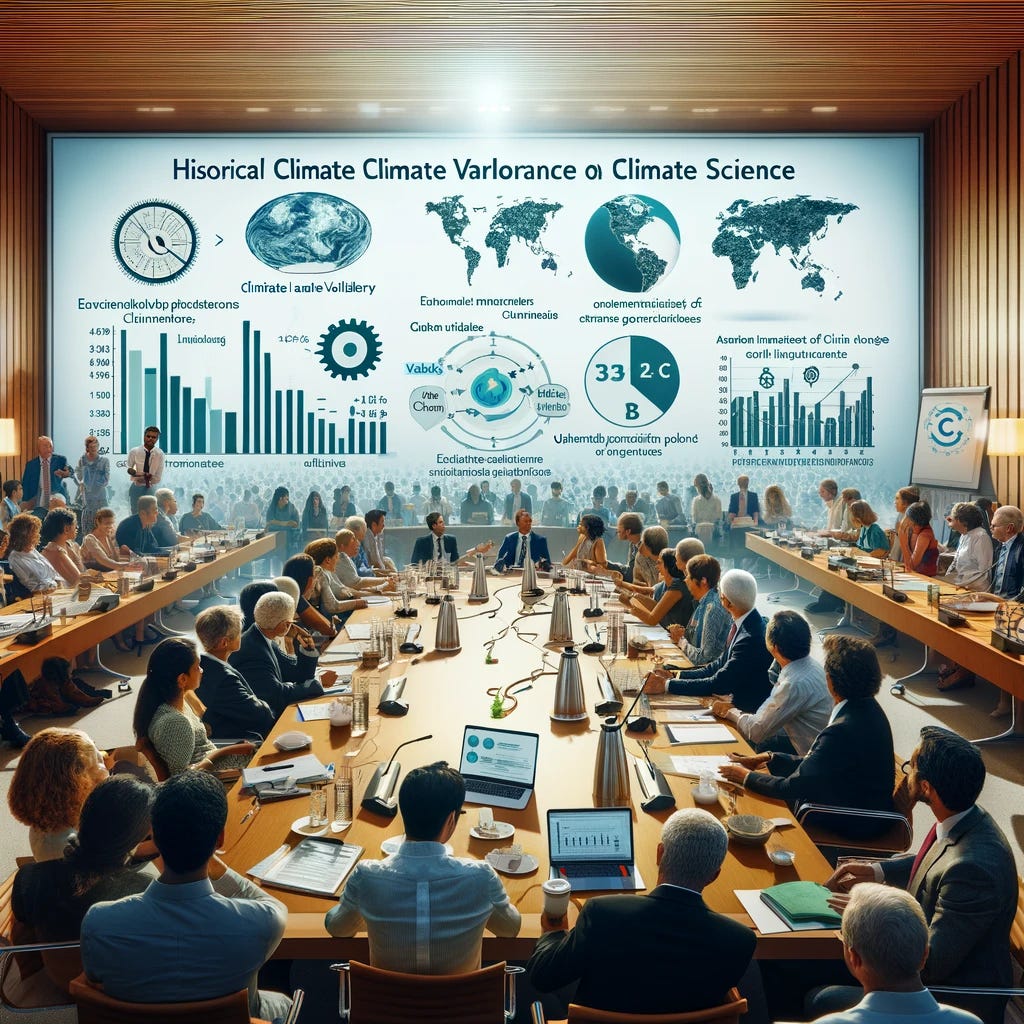The Call for a Balanced Approach to Climate Science and Policy
and thus it begins....
The Call for a Balanced Approach to Climate Science and Policy
Introduction
In the ongoing debate about climate change, there is a growing need for a balanced approach that separates scientific inquiry from political agendas. This essay argues the world climate declaration statement from Clintel, “that climate science should be less political, and climate policies should be more scientific. Scientists should openly address uncertainties and exaggerations in their predictions of global warming, while politicians should dispassionately count the real costs as well as the imagined benefits of their policy measures.”
Climate Science and Politics
1. Depoliticizing Climate Science:
Climate science has become highly politicized, with significant pressure on scientists to align their findings with prevailing political narratives. This politicization can lead to biased interpretations of data and exaggeration of potential impacts to support policy agendas. By striving for objectivity and transparency, scientists can provide more reliable and unbiased information that policymakers can trust (Pielke Jr., 2007).
2. Addressing Uncertainties and Exaggerations:
Scientific predictions of global warming inherently involve uncertainties due to the complex nature of climate systems and variability in climate models. These uncertainties should be openly acknowledged rather than downplayed. Exaggerated claims can undermine public trust and hinder constructive dialogue on climate policy. Curry (2011) emphasizes the importance of addressing these uncertainties to foster a more nuanced understanding of climate risks.
Scientific Climate Policies
1. Evidence-Based Policymaking:
Climate policies should be grounded in robust scientific evidence and cost-benefit analyses. Policymakers must evaluate the effectiveness and economic implications of proposed measures without succumbing to alarmist rhetoric. Lomborg (2020) argues that an evidence-based approach allows for the implementation of more efficient and cost-effective solutions to climate challenges.
2. Dispassionate Assessment of Costs and Benefits:
Politicians often emphasize the benefits of climate policies while overlooking or minimizing their costs. A thorough and dispassionate assessment of both costs and benefits is crucial for developing balanced and sustainable policies. The Heritage Foundation (2019) highlights the need for a comprehensive evaluation to avoid unintended economic and social consequences.
Integration of Science and Policy
1. Enhanced Collaboration:
Bridging the gap between science and policy requires enhanced collaboration and communication between scientists and policymakers. This collaboration can help ensure that policies are informed by the latest scientific research while also being pragmatic and feasible. The Copenhagen Consensus Center (2015) advocates for collaborative frameworks that integrate scientific insights with policy needs.
2. Transparent Communication:
Transparent communication of scientific findings and policy decisions is essential for public trust and engagement. Scientists and policymakers should work together to present information clearly and accurately, avoiding sensationalism. This approach helps the public make informed decisions and supports the legitimacy of climate policies (Pielke Jr., 2007).
Conclusion
The call for less political climate science and more scientific climate policies underscores the need for a balanced and evidence-based approach to addressing climate change. By openly addressing uncertainties and avoiding exaggerations, scientists can provide reliable information that forms the basis for sound policy decisions. Politicians, in turn, should conduct dispassionate assessments of the real costs and benefits of their measures, ensuring that policies are both effective and economically viable. Through enhanced collaboration and transparent communication, we can develop more sustainable and equitable solutions to the challenges posed by climate change.
References
- Curry, J. A. (2011). Climate science and the uncertainty monster. *Bulletin of the American Meteorological Society*, 92(12), 1667-1682.
- Heritage Foundation. (2019). *Economic Costs of Carbon Regulations*. Retrieved from [Heritage Foundation](https://www.heritage.org/).
- Lomborg, B. (2020). *False Alarm: How Climate Change Panic Costs Us Trillions, Hurts the Poor, and Fails to Fix the Planet*. Basic Books.
- Pielke Jr., R. A. (2007). *The Honest Broker: Making Sense of Science in Policy and Politics*. Cambridge University Press.
- Copenhagen Consensus Center. (2015). *Climate Change: Research and Analysis*. Retrieved from [Copenhagen Consensus](https://www.copenhagenconsensus.com/).
- CLINTEL. (n.d.). *There is no climate emergency*. Retrieved from [CLINTEL](https://clintel.org/).
This essay was written with the assistance of ChatGPT.




Team powerhouse. At it once again. Thank you.
May I use this verbatim when I address my city council?
Awesome principle to apply - very inspiring Maggie & team!